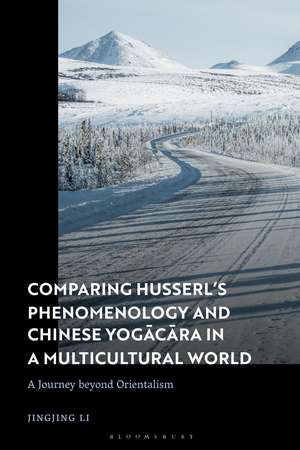Comparing Husserl’s Phenomenology and Chinese Yogacara in a Multicultural World: A Journey Beyond Orientalism
Autor Dr Jingjing Lien Limba Engleză Paperback – 29 noi 2023
| Toate formatele și edițiile | Preț | Express |
|---|---|---|
| Paperback (1) | 192.30 lei 6-8 săpt. | |
| Bloomsbury Publishing – 29 noi 2023 | 192.30 lei 6-8 săpt. | |
| Hardback (1) | 447.98 lei 3-5 săpt. | +29.77 lei 6-12 zile |
| Bloomsbury Publishing – 4 mai 2022 | 447.98 lei 3-5 săpt. | +29.77 lei 6-12 zile |
Preț: 192.30 lei
Nou
Puncte Express: 288
Preț estimativ în valută:
36.82€ • 38.34$ • 30.55£
36.82€ • 38.34$ • 30.55£
Carte tipărită la comandă
Livrare economică 14-28 februarie
Preluare comenzi: 021 569.72.76
Specificații
ISBN-13: 9781350256941
ISBN-10: 1350256943
Pagini: 272
Dimensiuni: 156 x 234 x 25 mm
Greutate: 0.39 kg
Editura: Bloomsbury Publishing
Colecția Bloomsbury Academic
Locul publicării:London, United Kingdom
ISBN-10: 1350256943
Pagini: 272
Dimensiuni: 156 x 234 x 25 mm
Greutate: 0.39 kg
Editura: Bloomsbury Publishing
Colecția Bloomsbury Academic
Locul publicării:London, United Kingdom
Caracteristici
Emphasises how comparative philosophy can go beyond the notion of Orientalism to promote constructive cross-cultural dialogue
Notă biografică
Jingjing Li is Assistant Professor of Chinese and Comparative Philosophy at the Institute for Philosophy at Leiden University, the Netherlands.
Cuprins
List of Abbreviations & A Note on Usage and Conventions Prologue Part I: The Journey1. Overcoming Orientalism with Multiculturalism 2. Contextualizing Chinese Yogacara 3. Contextualizing Husserl's Phenomenology Part II: The Road 4. Intentionality in Husserl's Phenomenology 5. Intentionality in Chinese Yogacara 6. Intentionality and Non-Conceptualism Part III: The Tracks7. Essence in Husserl's Phenomenology 8. Essence in Chinese Yogacara 9. Essence in Comparative Philosophy Part IV: The Destination 10. The Gate of Practice 11. The Path towards Awakening 12. Revisiting the Process of Awakening Epilogue BibliographyIndex
Recenzii
This book is an impressive and ambitious piece of scholarship in the field of intercultural comparative philosophy. Through the central problem of essence and the organizational metaphor of a journey, Jingjing Li engages two forms of phenomenology formulated by Husserl and Chinese Yogacara Buddhists, both of which are immensely complex. Li skillfully maintains the distinctiveness of the two philosophical projects in their own contexts while revealing their shared visions about the human mind in the course of her intercultural investigation. The book is methodologically sophisticated and philosophically substantive. It is a major contribution to the comparative study of Husserlian phenomenology and Yogacara Buddhist philosophy.
